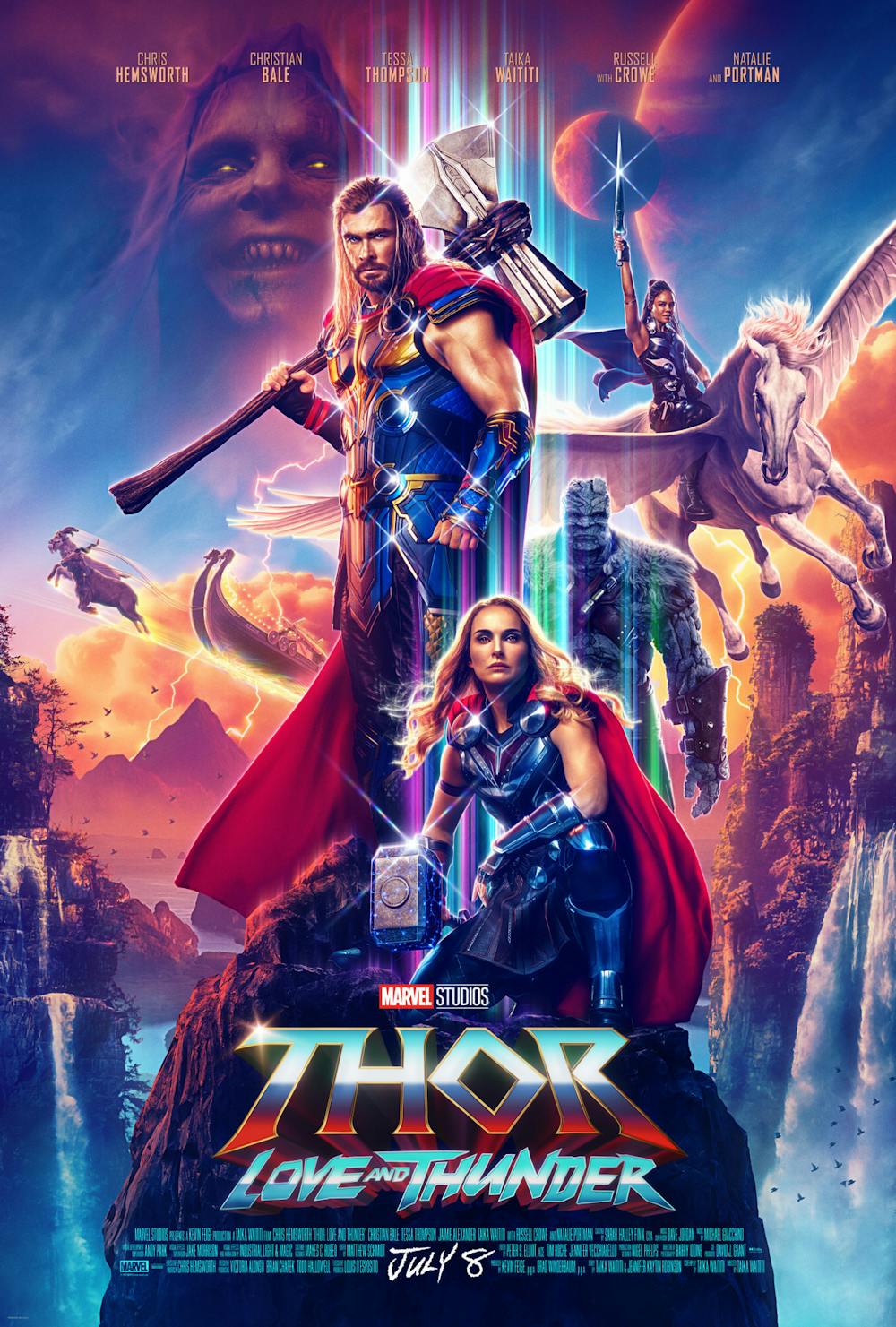Early in “Thor: Love and Thunder,” the latest Marvel Cinematic Universe (MCU) film from writer-director Taika Waititi, a world-weary Thor (Chris Hemsworth) is meditating when his trance is broken by Peter Quill (Chris Pratt), the leader of the Guardians of the Galaxy. “Thor, we need your help to win this battle,” Quill says. The god of thunder rises, flies to the battlefield and proceeds to decimate an army of aliens to the tune of Guns N’ Roses’ “Welcome to the Jungle.” Watching Thor answer his friends’ call to save them from defeat and then deliver on their request with rockstar swagger, it’s difficult not to imagine Waititi jamming to Led Zeppelin in his office only to be interrupted by MCU president Kevin Feige with an urgent plea: “Taika, we need your help to save the Marvel Cinematic Universe.”
God knows it needed saving. After “Avengers: Endgame” and “Spider-Man: Far from Home” put an end to the MCU’s truly miraculous run of 23 interconnected films in 2019, the studio has since dropped a string of uncharacteristically shaky releases. Recent movies have ranged from the dull (“Black Widow”), to the overhyped (“Spider-Man: No Way Home”) all the way to the downright bad (“Doctor Strange in the Multiverse of Madness”). Nonetheless, expectations were high for “Thor: Love and Thunder” coming off the massive success of “Thor: Ragnarok.” Ragnarok was Waititi’s 2017 MCU debut and the film that reinvigorated a stale Thor character by tapping into his wild comedic potential. And on the off chance that an office meeting between Waititi and Feige really occurred, the director’s effort in “Thor: Love and Thunder” would indicate that he answered the call for salvation with the same triumphant flair as his on-screen hero. With Hemsworth settling into the title role more comfortably than ever, Christian Bale delivering the MCU’s finest one-off villain performance and Waititi rattling off the blend of hilarious dialogue and sincere emotion that made “Ragnarok” a smash hit, “Thor: Love and Thunder” emerges as Marvel’s most utterly enjoyable outing since the glory days of “Endgame.”
Marvel movies of late have felt obligatory, as if the studio is releasing them only to service a request made by fans or inch closer towards its loftier universe-constructing goals. This is not “Thor: Love and Thunder,” however. The colorful superhero romp has a meaningful story to tell and demands that audiences see its reason for existence from the first frame. In a word, the film is alive. It crackles with deadpan wit, an onslaught of stinging one-liners and absurd gags making it the funniest film in Marvel’s collection since — surprise! — “Ragnarok.” Balancing out the relentless comedy are scenes of genuine dramatic feeling, none more impactful than the prologue’s introduction of Gorr the God Butcher (Christian Bale). Unveiling the tragic motivation behind the villain’s vow to kill all gods, the extended sequence makes it clear that the sequel to the laugh fest that was “Ragnarok” will not shy away from bearing the darkness necessary to tell an enduring story.
It’s fitting that Waititi would look to draw this darkness from Bale, who brings to the film a history of playing serious, morally challenging characters in films like David O. Russel’s “The Fighter” and Scott Cooper’s “Hostiles.” He’s one of the most captivating and versatile actors working in Hollywood today, and his performance in “Thor: Love and Thunder” proves just that. Stepping back into the superhero genre for the first time since playing Bruce Wayne in Christopher Nolan’s “The Dark Knight” trilogy, Bale clearly looks like he’s enjoying himself as a slithery, yellow-eyed demon with a deep-seated vendetta against Hemsworth’s Thor. He brings all the menace that one would expect from a character known as the god butcher, but in one of the film’s most satisfying elements, Bale’s Gorr is also possibly the MCU’s most sympathetic villain to date. The actor carefully conveys the character’s trauma in the pivotal prologue, setting up a comic book movie whose antagonist is refreshingly more than just an evil man with a plan.
The film isn’t called “Gorr: Love and Thunder,” though. If people are talking about this movie in one hundred years, it will be because of Chris Hemsworth’s take on the swashbuckling space viking. He is both the comedic and dramatic engine of the movie, carrying it with his charisma from start to finish by constantly pivoting between deliveries of Waititi’s riotous dialogue and moments of real, even graceful emotion. Marvel fans will remember Hemsworth’s initial role in “Thor,” Kenneth Branagh’s 2011 debut feature for the character. Comparing that performance with the one he gives ten years later is truly revelatory. Bearing resemblance to its director’s oft-portrayed Shakespearean heroes, the 2011 film’s Thor was an aristocratic brat with a dialect entrenched in the niceties of Elizabethan English. He would remain that way for his appearances in subsequent MCU films, slowly developing a personality as he tangled with Tony Stark and other “mere mortals,” but it was not until Waititi stepped in with “Ragnarok” that Thor finally became what he should have been all along: a wisecracking, self-deprecating, yet still mighty warrior battling enemies to a hard rock soundtrack. That’s the Thor of “Thor: Love and Thunder,” and he’s an absolute blast to follow through the film. Waititi and Hemsworth should be proud, because even if Thor never reaches the icon status enjoyed by Spider-Man or Captain America, their character holds claim to a special title no Marvel hero will ever take away from him: greatest comeback story.
Jack Torpey '24 (he/him) is an Arts and Culture Editor. He writes film reviews for the Reel Critic column.
Jack is studying English with a minor in Film and Media Culture. Outside The Campus, he works as a peer writing tutor at the Writing Center and is a member of the Middlebury Consulting Group.




